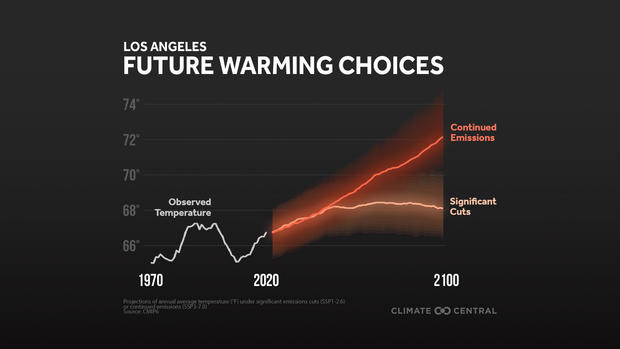2022 midterms have "significant stakes for the climate." These are the state and local measures to watch.
On Election Day 2022 there were a number of major issues on the line — and one of those issues could have implications for humanity as a whole: climate change.
"This midterm election has significant stakes for the climate," Geoffrey Henderson, a postdoctoral associate at Duke's Sanford School of Public Policy, told CBS News.
Clean energy, pollution and infrastructure upgrades are all important aspects of climate policy that found their way onto the ballot. Andrew Pershing, director of climate science at the nonpartisan research group Climate Central, told CBS News, "The earlier you act, the more effective the actions are and the cheaper they are and the more benefits you get."
"Even though the scientific consensus on climate change has been really well-known for decades, we haven't really had that action," he said. "And so every year that we don't act just means that the world is more expensive, and frankly, more dangerous for a lot of people."
Henderson said that "on its face, climate is a global problem."
"So typically, we think about addressing climate at a major scale," he said. "...So the question then becomes, what can localities do that makes a significant impact?"
CBS News found very few local and state measures on the ballot this year aimed at tackling climate and environmental issues. For Henderson, only two stood out: California's Proposition 30 and New York's Clean Water, Clean Air and Green Jobs Environmental Act.
"There are a lot of state and local ballot measures that are focused on the environment, but largely on things like conservation of forests and other habitats, as well as dedicating space for parks," Henderson said. "These two [California and New York] are the two that really stand out, alongside Rhode Island, which has an important, somewhat smaller-scale measure for adaptation. But these are the two that really stand out as far as their breadth and depth."
Here's what those measures entail, and how they fared in this year's midterms.
California – Proposition 30
A recent report by Bloomberg showed that the nation's most populated state, California, is on track to become the fourth-largest economy in the world. That growth makes Proposition 30 all the more significant. This measure would increase tax on personal income above $2 million by 1.75%, according to Ballotpedia.
According to the Legislative Analyst's Office, a nonpartisan fiscal and policy adviser, the tax would be implemented in January and run through January 2043. But if the state manages to drop its statewide greenhouse gas emissions below a certain threshold earlier than that, the tax could be lowered sooner.
The proposed tax was estimated to bring in between $3.5 billion to $5 billion every year. That revenue would be split three ways: 45% to help individuals, businesses and governments purchase new zero-emissions vehicles; 35% to help with electric vehicle (EV) infrastructure, such as charging stations; and 20% dedicated to wildfire response and prevention.
Henderson noted that at least half of the money for EVs would go to low-income communities, which is "really important" for the transition to clean energy vehicles.
But this measure has divided Democrats, and it faced opposition from Gov. Gavin Newsom, who said it amounts to a subsidy for rideshare companies. The California Teachers Association has also spoken out against the measure, saying that it "undermines funding for public education, health care, seniors and other essential services."
Rideshare companies are already required to start electrifying their California fleets in 2023.
UPDATE: Election outcome: Failed. According to California's Board of Elections, more than 3.1 million people — 59% of voters — said no to the proposition.
New York – Clean Water, Clean Air and Green Jobs Environmental Bond Act
This measure was New York's only statewide ballot proposal this year. It had already won approval in the state legislature, and if a majority of voters agreed, it would allow the state to sell bonds and borrow to fund up to $4.2 billion for projects to "reduce the impact of climate change."
Of that money, at least $1.1 billion would go to restoration and flood risk reduction; up to $1.5 billion would go to climate change mitigation; up to $650 million would go to land conservation and recreation; and at least another $650 million would go toward water quality improvement and resilient infrastructure. The state would also be allowed to refund the debt should lower interest rates arise.
There isn't a list of projects set in stone yet, but Ballotpedia noted that the proposal could bring green building projects, clean energy to low-income housing areas, zero-emission school buses and other projects that help reduce urban heat. About 35% of the funds would go toward communities exposed to environmental hazards and/or those that have been socioeconomically marginalized, Henderson said.
According to the Gothamist news site, there has not been significant opposition to the proposal other than from the Conservative Party of New York State, which argued against taking on more debt.
UPDATE: 2022 election outcome: Passed. As of 10:30 a.m. on Wednesday, the New York State Board of Elections shows that the proposal got strong approval, with more than 59% of voters saying yes to the measure.
Rhode Island – Question 3, Green Economy Bond
Rhode Island's measure would issue $50 million in bonds for environmental programs and recreational sites. According to the state's Department of Environmental Management, it would invest in green energy, climate resilience, water quality and more.
The money from the proposal would be used for a variety of environmental and climate initiatives, including $16 million to help communities improve coastal habitats, floodplains and infrastructure; $12 million for a carbon-neutral education center and event pavilion at Roger Williams Park and Zoo; $5 million to help small businesses implement clean energy projects, $6 million for Narragansett Bay and watershed restoration and forest and habitat restoration; and $4 million to clean up former industrial sites.
CBS News has not found any significant public opposition comments to this measure, and no organized opposition is cited on Ballotpedia.
UPDATE: 2022 election outcome: Passed. Unofficial results from the state's Board of Elections on Wednesday morning show that this measure received overwhelming support, with nearly 67% approval.
Other local measures
While these are the most significant ballot measures CBS News has found, there were numerous others around the country. To name a few: Denver voted on how to spend funds that were specifically raised to combat climate change, Florida considered whether to offer tax incentives to homeowners who make their properties more flood-resistant, and Louisiana voted on whether to allow local governments to waive water charges for customers who fall victim to infrastructure damage.
Beyond that, Henderson said, "There could be a lot of ballot measures that don't explicitly mention climate, but nonetheless have important implications for it."
Pershing and Henderson told CBS News that while national and international entities can have broader impacts, local actions do make a difference — at a time when experts say action is increasingly urgent.
Just last week, the United Nations warned that the planet is on track for 2.8 degrees Celsius of warming in less than 80 years, as nations fall short on plans to reduce greenhouse gas emissions.
"These changes that we've seen — more extreme heat, more fire, risks of droughts, risks of flood, all of these things — not only do they continue, but they get worse," Pershing said. "...Every degree that we can change matters."

